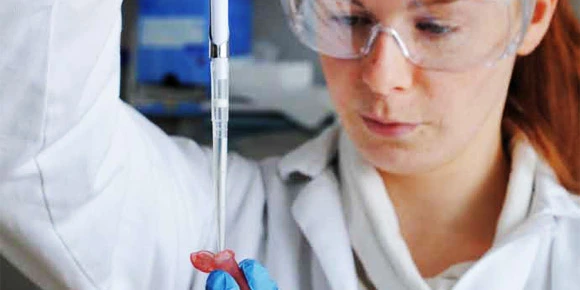Kneading and correlating
Drug delivery systems by Adlershof company TheraKine work like a Trojan horse
It’s a little like a chocolate factory in Andreas Voigt’s laboratories: Powders are poured, mixed, and kneaded by hand to specific consistencies. Instead of gustatory delights, however, this production targets gradual, controlled therapeutic effects. After founding his company TheraKine in 2009, Voigt and three employees manufacture so called drug delivery systems.
They work like a Trojan horse as a vehicle for medication. The creamy substance they contain carries tiny particles of medicinal agents that are then released in the human body exactly where they are needed. The body’s fluids slowly dissolve the biodegradable matrices, gradually releasing the agents.
“The drugs can be injected precisely, so their doses are far smaller than conventional forms of administration and their side effects can be contained,” explained Voigt when asked about the benefits. Moreover, he continued, a single treatment with this matrix ensures sustained effects, rendering superfluous, for instance, daily injections in sensitive areas like the eye.
TheraKine has patented its drug delivery system. Its effects with special antibodies have already been verified in the treatment of eye diseases. “Now we intend to explore further application fields and other agents as well,” said Voigt. Their most recent order from an American pharmaceuticals firm was to develop a matrix for certain hormones that regulate bone growth. One essential property affects the release rates from the matrix. The behavior of these hormones under the effects of various substances that resemble body fluids are analysed precisely and their release rates configured by the matrix’s composition and distribution of particles. The prime motivator behind this realignment is the new CEO, the US American Stan Yakatan. Yakatan has fallen for this four man company in Adlershof and intends to make TheraKine fit for a larger market.
This is what Jürgen Leonhardt is also doing. The retired professor of the Academy of Sciences is planning the future of his new institute, the IUT Medical. He sees a highly promising field of operations in the analysis of egesta for the diagnosis of illnesses. At present there are about 25 substances that correlate with particular symptoms. For instance, ammonia indicates a liver disorder, acetone diabetes and nitrogen oxides mood disorders. The contributions from the IUT Medical will take the form of its expertise in ultra sensitive analytics and the setup of a new generation of measuring technology that not only provides precise data, but also analyses them for potential correlations. IUT will be supported by its American partner Oncologix, a company that intends to introduce this technology to the American market as well.
By Uta Deffke for Adlershof Special
